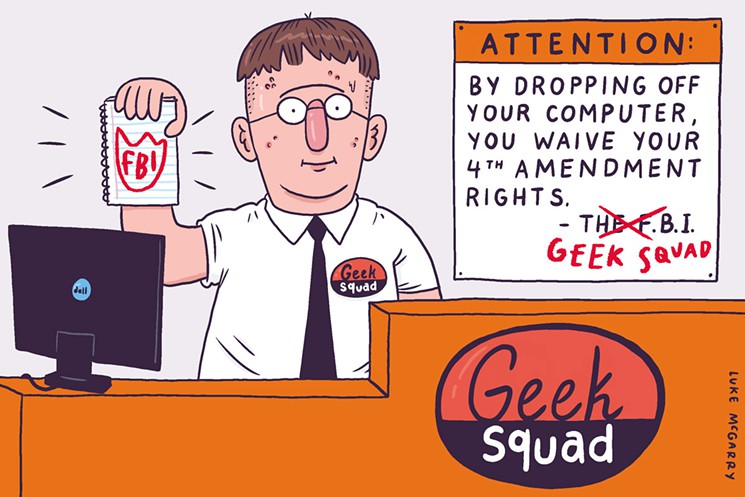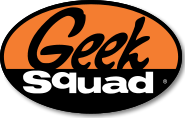JANUARY 2017: Best Buy's computer repair department
the "Geek Squad" (What an insulting, anti-intellectual name. Do you have
to be autistic to work there?) has been in trouble over the years
as I
previously detailed
here. Now they are in a really big scandal. It all started
in May 2016 at a kiddie porn trial. First let me say KIDDIE PORN IS SICK,
ILLEGAL AND WRONG! But that isn't the issue here.
The case in question
involves Dr. Mark Rettenmaier, a gynecological oncologist in Orange County,
California, who brought his desktop in to a Best Buy for repairs in November
2011. For some reason his computer was shipped to Kentucky (first
in marijuana farming last in in education spending). Why would anyone ship
a computer from CA to KY to be fixed? Just give it to me right here in West
Hollywood! A technician at Best Buy's repair facility in KY an image of
a naked prepubescent girl on a bed in a choke collar, then informed his
boss, who told the FBI. Both Best Buy employees received some payment from
the FBI, as did at least six others over four years, court records show.
Rettenmaier's lawyer, James D. Riddet, argues that the relationship
between the FBI and the Geek Squad is "so cozy" and extensive "it turns
searches by Best Buy into government searches." Court records show the "FBI
and Best Buy made sure that during the period from 2007 to the present,
there was always at least one supervisor who was an active informant," Riddet
told
OC Weekly. Riddet says agents conducted two additional searches
of the computer without obtaining necessary warrants, lied to trick a federal
magistrate judge into authorizing a search warrant, then tried to cover
up their misdeeds by initially hiding records.
The defense in the
child pornography trial alleged that the FBI used a member of electronics
retailer Best Buy's tech support team, Geek Squad, to peer into the accused's
computer on the hunt for evidence of child pornography. Since then, the
defense's lawyers revealed that the FBI had cultivated at least eight of
the company's IT "geeks" over a four-year period to serve as confidential
informants, who all received some payment for turning over data. Obviously,
this raises serious questions about whether sending devices into the repair
shop forfeits a person's right to privacy or unreasonable search and seizure.
The eight Geek Squad members in question worked in the tech support
branch's repair center in Brooks, Kentucky, servicing items sent in from
all over the country. Technically,
users sign consent to search
over to Best Buy when they hand their devices over to get fixed.
This includes fine print indicating that any evidence of child pornography
would require the company to hand the device over to authorities.

But
if the FBI paid each of its informants to pass along evidence they'd acquired
in the course of their normal job, and plan to keep doing so in future cases,
wouldn't that make Best Buy's employees functional agents of the bureau?
A federal judge is allowing the case's defense attorneys to explore that
relationship between company and government which functionally allowed the
FBI to bypass the need for a warrant or acquire specific consent to search.
On the first day of the inquiry, an FBI agent's testimony cast doubt on
whether the initial image found by the Geek Squad member and informant technically
qualified as child pornography to warrant bureau action.
Another
problem is that, in this case, the child pornography found was on the drive's
unallocated space, i.e. space that the file system is able to use for new
data, not capacity containing the files the customer wanted preserved. Accessing
files in unallocated space requires going above and beyond the job the customer
contracted for, as well as extra software to recover deleted data. A Federal
appeals court has ruled that data in unallocated space is insufficient to
prove that the user knew of its existence. Finding files in unallocated
space is HARD and takes time and expertise. Apparently the Best Buy employees
were motivated by payouts from the FBI to snoop around.
"The government
concedes it presented no evidence that Flyer knew of the presence of the
files on the unallocated space of his Gateway computer's hard drive," declared
judges at the United States Court of Appeals for the Ninth Circuit before
overturning that conviction. "The government also concedes it presented
no evidence that Flyer had the forensic software required to see or access
the files. . . . Deletion of an image alone does not support a conviction
for knowing possession of child pornography on or about a certain date within
the meaning of [federal law]. No evidence indicated that Flyer could recover
or view any of the charged images in unallocated space or that he even knew
of their presence there."
I don't know how information can even
be STORED on "unallocated space" and I'm a PC expert! It's possible
the image was saved in a strange place by malware or a virus used to blackmail
people.
But the biggest issue remains whether Geek Squad technicians
acted as secret law-enforcement agents and, thus, violated Fourth Amendment
prohibitions against warrantless government searches. Riddet claims records
show "FBI and Best Buy made sure that during the period from 2007 to the
present, there was always at least one supervisor who was an active informant."
He also said, "The FBI appears to be able to access data at [Best Buy's
main repair facility in Brooks, Kentucky] whenever they want." Calling the
relationship between the agency and the Geek Squad relevant to pretrial
motions, Carney approved Riddet's request to question agents under oath.


 But
if the FBI paid each of its informants to pass along evidence they'd acquired
in the course of their normal job, and plan to keep doing so in future cases,
wouldn't that make Best Buy's employees functional agents of the bureau?
A federal judge is allowing the case's defense attorneys to explore that
relationship between company and government which functionally allowed the
FBI to bypass the need for a warrant or acquire specific consent to search.
On the first day of the inquiry, an FBI agent's testimony cast doubt on
whether the initial image found by the Geek Squad member and informant technically
qualified as child pornography to warrant bureau action.
But
if the FBI paid each of its informants to pass along evidence they'd acquired
in the course of their normal job, and plan to keep doing so in future cases,
wouldn't that make Best Buy's employees functional agents of the bureau?
A federal judge is allowing the case's defense attorneys to explore that
relationship between company and government which functionally allowed the
FBI to bypass the need for a warrant or acquire specific consent to search.
On the first day of the inquiry, an FBI agent's testimony cast doubt on
whether the initial image found by the Geek Squad member and informant technically
qualified as child pornography to warrant bureau action. 
